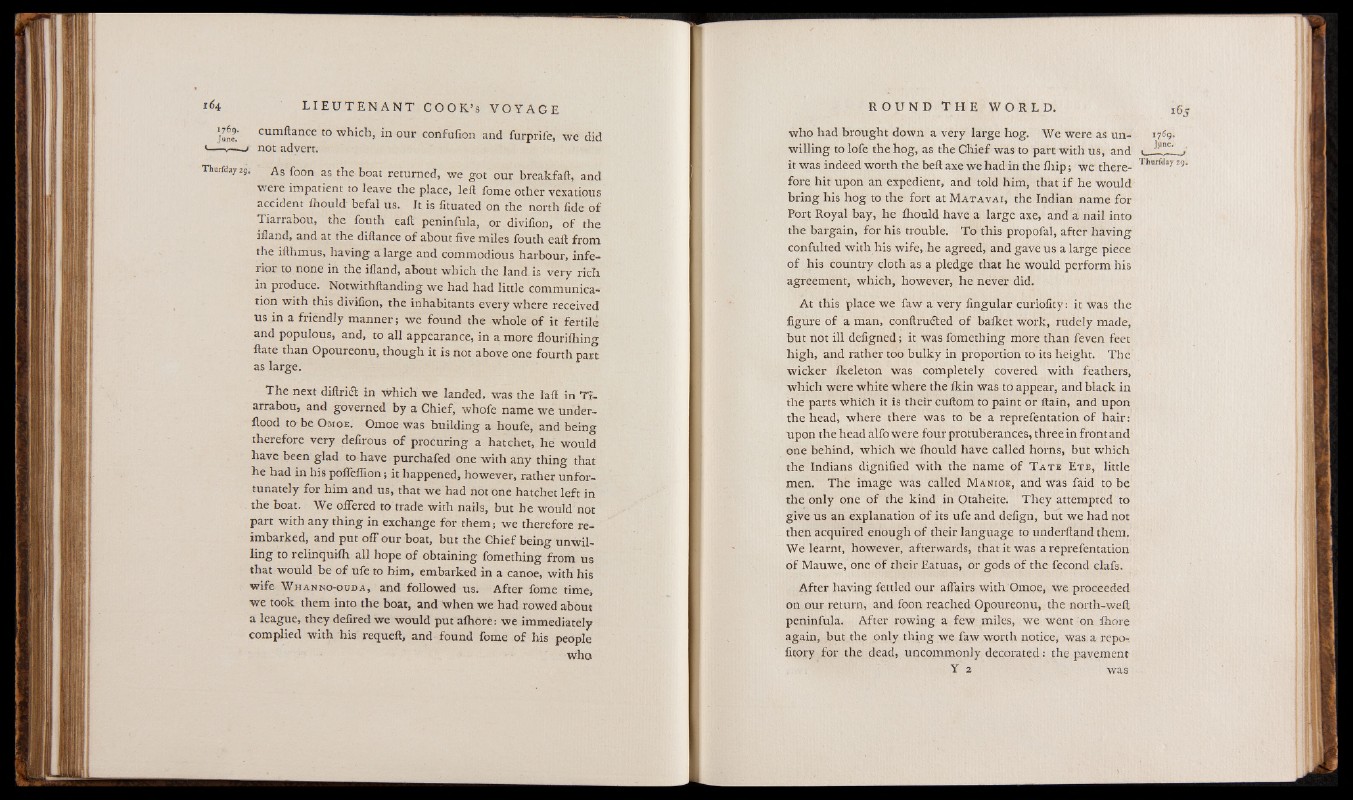
June." cumftance to which, in our confufion and furprife, we did
>----not advert.
Thiirfday 29; As foon as the boat returned, we got our breakfaft, and
were impatient to leave the place, left fome other vexatious
accident fhould befal us. It is fituated on the north fide of
Tiarrabou, the fouth eaft peninfula, or divifion, of the
ifland, and at the diftance of about five miles fouth eaft from
the ifthmus, having a large and commodious harbour, inferior
to none in the illand, about which the land-is very rich
in produce. Notwithftanding we had had little communication
with this divifion, the inhabitants every where received
us in a friendly manner; we found the whole of it fertile
and populous, and, to all appearance, in a more flourilhing
ftate than Opoureonu, though it is not above one fourth part
as large.
The next diftria in which we landed, was the laft in Tiarrabou,
and governed by a Chief, whofe name we under-
ftood to be Omoe. Omoe was building a houfe, and being
therefore very defirous o f procuring a hatchet, he would
have been glad to have purchafed one with any thing that
he had in his polleflion; it happened, however, rather unfortunately
for him and us, that we had not one hatchet left in
the boat. We offered to trade with nails, but he would not
part with any thing in exchange for them; we therefore re-
imbarked, and put off our boat, but the Chief being unwilling
to relinquifh all hope of obtaining fomething from us
that would be of ufe to him, embarked in a canoe, with his
wife Whanno-ouda, and followed us. After fome time;
we took them into the boat, and when we had rowed about
a league, they defired we would put afhore: we immediately
complied with his requeft, and found fome of his people
who
who had brought down a very large hog. We were as un- 1769.
willing to lofe the hog, as the Chief was to part with us, and ■ J'une' ■
it was indeed worth the beft axe we had in the fliip; we there- ThaM*y 29•
fore hit upon an expedient, and told him, that i f he would
bring his hog to the fort at Ma t a v a i , the Indian name for
Port Royal bay, he fhould have a large axe, and a nail into
the bargain, for his trouble. To this propofal, after having
confulted with his wife, he agreed, and gave us a large piece
of his country cloth as a pledge that he would perform his
agreement, which, however, he never did.
At this place we faw a very fingular curiofity: it was the
figure of a man, conftrudled of bafket work, rudely made,
but not ill defigned; it was fomething more than feven feet
high, and rather too bulky in proportion to its height. The
wicker fkeleton was completely covered with feathers,
which were white where the Ikin was to appear, and black in
the parts which it is their cuftom to paint or ftain, and upon
the head, where there was to be a reprefentation of hair:
upon the head alfo were four protuberances, three in front and
one behind, which we fhould have called horns, but which
the Indians dignified with the name of T ate Ete, little
men. The image was called Manioe, and was faid to be
the only one of the kind in Otaheite. They attempted to
give us an explanation of its ufe and defign, but we had not
then acquired enough of their language to underftand them.
We learnt, however, afterwards, that it was a reprefentation
of Mauwe, one of their Eatuas, or gods of the fecond clafs.
After having fettled our affairs with Omoe, we proceeded
on our return, and foon reached Opoureonu, the north-weft
peninfula. After rowing a few miles, we went on fhore
again, but the only thing we faw worth notice, was a repo-,
fitory for the dead, uncommonly decorated: the pavement
Y 2 was